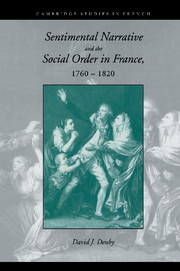Book contents
- Frontmatter
- Contents
- Acknowledgements
- Note on spelling
- Introduction: the politics of tears
- 1 Three sentimental writers
- 2 Towards a model of the sentimental text
- 3 Love and money: social hierarchy in the sentimental text
- 4 Sentimentalism in the rhetoric of the Revolution
- 5 Sentimentalism and idéologie
- 6 Beyond sentimentalism? Madame de Staël
- Conclusions
- Notes
- Bibliography
- Index
- CAMBRIDGE STUDIES IN FRENCH
6 - Beyond sentimentalism? Madame de Staël
Published online by Cambridge University Press: 29 August 2009
- Frontmatter
- Contents
- Acknowledgements
- Note on spelling
- Introduction: the politics of tears
- 1 Three sentimental writers
- 2 Towards a model of the sentimental text
- 3 Love and money: social hierarchy in the sentimental text
- 4 Sentimentalism in the rhetoric of the Revolution
- 5 Sentimentalism and idéologie
- 6 Beyond sentimentalism? Madame de Staël
- Conclusions
- Notes
- Bibliography
- Index
- CAMBRIDGE STUDIES IN FRENCH
Summary
A number of factors suggest that an analysis of the work of Madame de Staël through the prism of sentimentalism would be useful and instructive. An enthusiastic reader of Rousseau, she is a daughter of the Enlightenment who goes through the experience of the Revolution and the Empire chastened but unchanged in her faith in the basic tenets of Enlightenment. She writes both imaginative and historical–social works, thus spanning at least part of the range which this study seeks to cover. She is a Protestant. Finally, and most importantly, she is a woman and a feminist: given the crucial importance of women in the stock dramatis personae of sentimentalism, and the potential feminism of some of the claims regarding love and marriage which sentimentalism has been seen to articulate, it seemed inadmissible not to devote a chapter to the most famous woman writer of the period.
The essay De l'influence des passions sur le bonheur des individus et des nations, begun in 1792 and published in 1796, provides a clue to the role which sentimentalism plays in the career of Madame de Staël. The essay is incomplete: the second part, which would have corresponded to the element ‘et des nations’ in the title, was never written, with the result that, formally, the essay concerns only the happiness of individuals. It is divided into three sections: ‘Des passions’, ‘Des sentiments qui sont l'intermédiaire entre les passions et les ressources qu'on trouve en soi’, and ‘Des ressources qu'on trouve en soi’.
- Type
- Chapter
- Information
- Sentimental Narrative and the Social Order in France, 1760–1820 , pp. 194 - 239Publisher: Cambridge University PressPrint publication year: 1994



